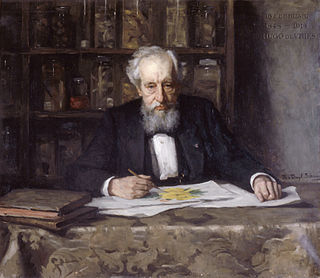A Darwin machine (a 1987 coinage by William H. Calvin, by analogy to a Turing machine) is a machine that, like a Turing machine, involves an iteration process that yields a high-quality result, but, whereas a Turing machine uses logic, the Darwin machine uses rounds of variation, selection, and inheritance.
In its original connotation, a Darwin machine is any process that bootstraps quality by using all of the six essential features of a Darwinian process: A pattern is copied with variations, where populations of one variant pattern compete with another population, their relative success biased by a multifaceted environment (natural selection) so that winners predominate in producing the further variants of the next generation (Darwin's inheritance principle).
More loosely, a Darwin machine is a process that uses some subset of the Darwinian essentials, typically natural selection to create a non-reproducing pattern, as in neural Darwinism. Many aspects of neural development use overgrowth followed by pruning to a pattern, but the resulting pattern does not itself create further copies.
Darwin machine has been used multiple times to name computer programs after Charles Darwin.

Natural selection is the differential survival and reproduction of individuals due to differences in phenotype. It is a key mechanism of evolution, the change in the heritable traits characteristic of a population over generations. Charles Darwin popularised the term "natural selection", contrasting it with artificial selection, which is intentional, whereas natural selection is not.

Neural Darwinism is a biological, and more specifically Darwinian and selectionist, approach to understanding global brain function, originally proposed by American biologist, researcher and Nobel-Prize recipient Gerald Maurice Edelman. Edelman's 1987 book Neural Darwinism introduced the public to the theory of neuronal group selection (TNGS) – which is the core theory underlying Edelman's explanation of global brain function.

William H. Calvin is an American theoretical neurophysiologist and professor at the University of Washington in Seattle. He is known for popularizing neuroscience and evolutionary biology, including the hybrid of those two fields, neural Darwinism. He relates abrupt climate change to human evolution and more recently has been working on global climate change issues.
In computer science, evolutionary computation is a family of algorithms for global optimization inspired by biological evolution, and the subfield of artificial intelligence and soft computing studying these algorithms. In technical terms, they are a family of population-based trial and error problem solvers with a metaheuristic or stochastic optimization character.
Bio-inspired computing, short for biologically inspired computing, is a field of study which seeks to solve computer science problems using models of biology. It relates to connectionism, social behavior, and emergence. Within computer science, bio-inspired computing relates to artificial intelligence and machine learning. Bio-inspired computing is a major subset of natural computation.

George John Romanes FRS was a Canadian-Scots evolutionary biologist and physiologist who laid the foundation of what he called comparative psychology, postulating a similarity of cognitive processes and mechanisms between humans and other animals.
Emergent evolution is the hypothesis that, in the course of evolution, some entirely new properties, such as mind and consciousness, appear at certain critical points, usually because of an unpredictable rearrangement of the already existing entities. The term was originated by the psychologist C. Lloyd Morgan in 1922 in his Gifford Lectures at St. Andrews, which would later be published as the 1923 book Emergent Evolution.
The expression computational intelligence (CI) usually refers to the ability of a computer to learn a specific task from data or experimental observation. Even though it is commonly considered a synonym of soft computing, there is still no commonly accepted definition of computational intelligence.

Mutationism is one of several alternatives to evolution by natural selection that have existed both before and after the publication of Charles Darwin's 1859 book On the Origin of Species. In the theory, mutation was the source of novelty, creating new forms and new species, potentially instantaneously, in sudden jumps. This was envisaged as driving evolution, which was thought to be limited by the supply of mutations.
Evolutionary ethics is a field of inquiry that explores how evolutionary theory might bear on our understanding of ethics or morality. The range of issues investigated by evolutionary ethics is quite broad. Supporters of evolutionary ethics have claimed that it has important implications in the fields of descriptive ethics, normative ethics, and metaethics.
A memetic algorithm (MA) in computer science and operations research, is an extension of the traditional genetic algorithm (GA) or more general evolutionary algorithm (EA). It may provide a sufficiently good solution to an optimization problem. It uses a suitable heuristic or local search technique to improve the quality of solutions generated by the EA and to reduce the likelihood of premature convergence.
Darwinian literary studies is a branch of literary criticism that studies literature in the context of evolution by means of natural selection, including gene-culture coevolution. It represents an emerging trend of neo-Darwinian thought in intellectual disciplines beyond those traditionally considered as evolutionary biology: evolutionary psychology, evolutionary anthropology, behavioral ecology, evolutionary developmental psychology, cognitive psychology, affective neuroscience, behavioural genetics, evolutionary epistemology, and other such disciplines.
Evolutionary music is the audio counterpart to evolutionary art, whereby algorithmic music is created using an evolutionary algorithm. The process begins with a population of individuals which by some means or other produce audio, which is either initialized randomly or based on human-generated music. Then through the repeated application of computational steps analogous to biological selection, recombination and mutation the aim is for the produced audio to become more musical. Evolutionary sound synthesis is a related technique for generating sounds or synthesizer instruments. Evolutionary music is typically generated using an interactive evolutionary algorithm where the fitness function is the user or audience, as it is difficult to capture the aesthetic qualities of music computationally. However, research into automated measures of musical quality is also active. Evolutionary computation techniques have also been applied to harmonization and accompaniment tasks. The most commonly used evolutionary computation techniques are genetic algorithms and genetic programming.
Julian Huxley used the phrase "the eclipse of Darwinism" to describe the state of affairs prior to what he called the "modern synthesis". During the "eclipse", evolution was widely accepted in scientific circles but relatively few biologists believed that natural selection was its primary mechanism. Historians of science such as Peter J. Bowler have used the same phrase as a label for the period within the history of evolutionary thought from the 1880s to around 1920, when alternatives to natural selection were developed and explored—as many biologists considered natural selection to have been a wrong guess on Charles Darwin's part, or at least to be of relatively minor importance.
Universal Darwinism, also known as generalized Darwinism, universal selection theory, or Darwinian metaphysics, is a variety of approaches that extend the theory of Darwinism beyond its original domain of biological evolution on Earth. Universal Darwinism aims to formulate a generalized version of the mechanisms of variation, selection and heredity proposed by Charles Darwin, so that they can apply to explain evolution in a wide variety of other domains, including psychology, linguistics, economics, culture, medicine, computer science, and physics.

Artificial life is a field of study wherein researchers examine systems related to natural life, its processes, and its evolution, through the use of simulations with computer models, robotics, and biochemistry. The discipline was named by Christopher Langton, an American theoretical biologist, in 1986. In 1987 Langton organized the first conference on the field, in Los Alamos, New Mexico. There are three main kinds of alife, named for their approaches: soft, from software; hard, from hardware; and wet, from biochemistry. Artificial life researchers study traditional biology by trying to recreate aspects of biological phenomena.

The following outline is provided as an overview of and topical guide to evolution:

This glossary of artificial intelligence is a list of definitions of terms and concepts relevant to the study of artificial intelligence, its sub-disciplines, and related fields. Related glossaries include Glossary of computer science, Glossary of robotics, and Glossary of machine vision.
Cultural evolution is an evolutionary theory of social change. It follows from the definition of culture as "information capable of affecting individuals' behavior that they acquire from other members of their species through teaching, imitation and other forms of social transmission". Cultural evolution is the change of this information over time.
Henry Charles Plotkin was a British evolutionary psychologist who applied Darwinian principles to the understanding of the mind, behavior, culture and knowledge.







